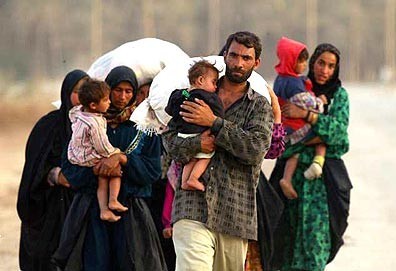In order to defeat an idea, you have to understand it.
Here’s an idea:
Millions of people who share a common heritage but live in different countries can unite under a single, benevolent ruler, with a single legal code that is fair and just, with common goals and a common view of the world. All will be treated equally; all will be protected. There will be no more bullying by dictators, thugs and secret police. There will be no more corruption. Factions will be unified. Life will be holy. There will be jobs and prosperity for all. The artificial borders imposed by outsiders will disappear. The very rich countries will now have to share with the poor countries.
This idea creates an entirely new world. It creates paradise.
The Islamic State of the Levant promises this to Muslims. It is why people leave their homes and go fight for it, and why towns welcome the rebels.
This is the idea that must be understood.
In America, we are prone to depicting enemies as psychopathic killers and leaving it at that. Rarely do we apply reason and ask: Why are so many people, normal people, following psychopaths?
 Power-hungry monsters will always exist, but to a large extent they must earn the consent of the people in order to rule. The ambitions of most people rarely exceed the simple desire to raise and care for a family. If people think the monsters can help them do this, then the monsters will take on the appearance of saviors and be allowed to lead.
Power-hungry monsters will always exist, but to a large extent they must earn the consent of the people in order to rule. The ambitions of most people rarely exceed the simple desire to raise and care for a family. If people think the monsters can help them do this, then the monsters will take on the appearance of saviors and be allowed to lead.
In nations where it is easy to raise and care for a family, this flirtation with monsters is incomprehensible. Nevertheless, it is real.
The monsters in Iraq and Syria now number about 30,000. The Iraqi army is almost 10 times larger. It is not the size of the fighting force that makes the Islamic State of the Levant strong. It is its idea of an enviable path through the chaos, tyranny and fragmentation within the Muslim world.
Much has been written about the rebels we know as ISIS, but almost none of it explains the group’s remarkable growth and success. The exception is a recent New York Times article by David D. Kirkpatrick, who did a simple thing. He went to Tunisia and asked people why they sympathize with ISIS.
Sufian Abbas, 31, a student sitting at a street café, must have given Kirkpatrick a look of disbelief before he answered with his own question, “Don’t you see it as a source of pride?”
Beheadings of innocent people a source of pride? No. The Tunisians believe the accounts of atrocities are fabrications of western media.
“The Islamic State is a true caliphate, a system that is fair and just, where you don’t have to follow somebody’s orders because he is rich or powerful,” said a fellow named Ahmed. “It is action, not theory, and it will topple the whole game.”
Kirkpatrick said people who have left Tunisia for ISIS territory often email friends and describe a better life. It is noteworthy that a good number of those attracted to the movement are unemployed and not particularly religious.
One who is religious and an ultraconservative said, “If I am going to get arrested and beaten here anyway, I might as well go where I can have an impact.”
The good news is that some Tunisians have returned home with reports that ISIS has not created paradise, that promises are false and joiners may be forced to do things against their will.
More will realize this, but by the time they do the Islamic State will have controlled more territory and be in a position to exert more force against the people who no want to give consent.
And this is why we must understand the idea of ISIS and come up with a better one — and soon. It must be a practical and convincing idea, one applicable to the culture. At all costs, we must avoid a rough and forceful attempt to sell western style democracy to Muslims. This will work about as well as ham at a bar mitzvah.
The big myth is that the world wants to be like us. Strategically, this kind of thinking gets us nowhere. It is much better to accept the undiscovered truth that other cultures can be with us without being like us.
Let’s begin at that point. From there I believe we can make progress.
By Lanny Morgnanesi















